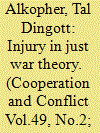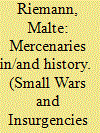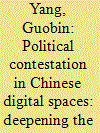|
|
|
Sort Order |
|
|
|
Items / Page
|
|
|
|
|
|
|
| Srl | Item |
| 1 |
ID:
115825


|
|
|
|
|
| Publication |
2012.
|
| Summary/Abstract |
Modern Nigerian poetry in English has proved to be a significant medium of action against authoritarian leadership in Nigeria. In historicizing the socio-political condition of regimes, Nigerian poets have responded to circumstances distinct to their historical period. This article examines the work of the younger writers widely regarded as the third generation of Nigerian poets, the condition of its production, and its 'generational' response to the dictatorships of General Ibrahim Badamosi Babangida (1985-93) and the late General Sani Abacha (1993-8). The article argues that while older Nigerian poets also responded to the intense oppression caused by these regimes, the third generation poets represent one of the prominent counter-hegemonic cultural practices in the decade between the 1980s and the 1990s. United by a collective spirit, they raise a generational, coherent counter-hegemonic discourse against these regimes, despite the difficulties they had to face. The article is an attempt to map out this new, relatively unknown poetry and what might be called its aesthetics of rage.
|
|
|
|
|
|
|
|
|
|
|
|
|
|
|
|
| 2 |
ID:
132331


|
|
|
|
|
| Publication |
2014.
|
| Summary/Abstract |
The paper traces the evolution of just war discourse and its historicity. Taking St Augustine's crucial definition of just war as a war to avenge injuries as our starting point, we focus on the concept of injury in 'just war' discourse. The genealogy of the notion of injury is traced through the continuities, ruptures, and leaps in the evolution of its meaning, starting from the conceptualization of just war in medieval thinking to its manifestation in feminist thought. It specifically explores two aspects of the way injury is conceptualized: the meaning ascribed to the actual concept of injury and, secondly, the constructed appropriate reaction to injury. In conclusion, we assess how far injury is indeed socially constructed and try to determine the impact of its socially constructed meaning on just war thinking and possibly warlike practices.
|
|
|
|
|
|
|
|
|
|
|
|
|
|
|
|
| 3 |
ID:
188313


|
|
|
|
|
| Summary/Abstract |
The history of the mercenary seems little less than the history of organized warfare itself. From the dawn of recorded history to the recent rise of Private Military Companies, mercenaries appear as a historical constant that allows scholars to make grand historical claims about the organisation of force within world history. This article cautions against this view, arguing instead that the analysis of this actor has been compromised by the failure to adequately historicise and contextualize the concept of the mercenary due to the uncritical acceptance that mercenaries are a trans-historical occurrence. Informed by a historicist contextual approach, I show how two foundational characteristics of the mercenary concept, a Westphalian understanding of ‘foreignness’ and a modern account of ‘self-interest’, were absent in the periods preceding the 18th century. I demonstrate this absence through an analysis of ‘mercenaries’ in Ancient Greece and the Middle Ages, exposing how the problematization of these actors within their own historical context displays a radical difference if compared to our contemporary understanding of the mercenary. In doing so this article raises awareness to the historical specificity of this seemingly universal concept and cautions against the uncritical backward projection of this concept into the past.
|
|
|
|
|
|
|
|
|
|
|
|
|
|
|
|
| 4 |
ID:
133727


|
|
|
|
|
| Publication |
2014.
|
| Summary/Abstract |
Although research on the Chinese Internet is thriving, our understanding of its multidimensional character, its diverse forms, actors, and dynamics remains limited. This is due to a tendency to focus on technology at the expense of meaning and people, as well as a bias towards sweeping and dichotomous analytical categories, such as state vs. netizens, politics vs. entertainment, and authoritarianism vs. democracy. One of the perniciously appealing ways of sensationalizing the Chinese Internet falls under this either/or dichotomy. The seven contributions in this special issue of China Information challenge such binaries, thus deepening the critical inquiry into the multiple dimensions of the Chinese Internet. The authors show a more complex and nuanced picture of actors and contestation in Chinese digital spaces, as well as the symbolic forms and consequences of these contestations, illuminating new meanings of the political and new dimensions of digital contestation, including race, class and their interactions with the nation. Together, these articles exemplify an analytical orientation that I refer to as 'deep Internet studies'. They explore the Internet as a facet of a deep China by linking it to people's practical, perceptual, and moral experiences as well as to the contexts of institutions, politics, and policies.
|
|
|
|
|
|
|
|
|
|
|
|
|
|
|
|
| 5 |
ID:
132010


|
|
|
|
|
| Publication |
2014.
|
| Summary/Abstract |
This article discusses U.S. penetration of Greece in 1947-1952, but also the shaping of a more balanced relationship later in the 1950s. Analysis includes both the official, political/strategic relationship, but also the cultural level and the activities of American nongovernmental educational institutions in Greece, an aspect largely ignored by available scholarship. It is argued that the United States was successful because, apart from ensuring the victory of the pro-Western forces in the Greek civil war, it stimulated economic development, transfer of ideas, political change and renovation, and eventually Greece's integration in the hard core of the postwar West. The U.S. experience of Greece, especially during an early phase (the late 1940s), played an important role in the shaping of containment policies, which were not simply anti-Soviet and anti-Communist, and also involved U.S. leadership of an institutionalized, value-oriented West.
|
|
|
|
|
|
|
|
|
|
|
|
|
|
|
|
|
|
|
|
|